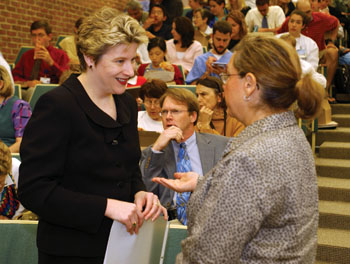
Patricia Heberer, Ph.D., left, speaks with Felicia Anchor, chair of the Tennessee Holocaust Convention, before her recent Dean’s Lecture on Nazism and medical ethics.
photo by Anne Rayner
Speaker traces collision between medical ethics, Nazi attrocities
There’s a 500-year-old saying that a physician should “cure sometimes, relieve often and comfort always.” Though seemingly set in stone, this ideal has been shaken over the years — most profoundly during the 1930s and 1940s when German medical professionals lent their services to the National Socialist Party.
In the Sept. 28 Dean’s Lecture, “The Nazis and Medical Ethics, Context and Lessons,” Patricia Heberer, Ph.D., historian within the Center for Advanced Holocaust Studies for the United States Holocaust Memorial Museum, and Alan L. Wells, Ph.D., M.P.H., senior research associate at Institute of Ethics for the American Medical Association, raised the issue of “deadly medicine.”
“Physicians, psychiatrists, nurses and other medical professionals committed or helped commit some of the most terrible crimes of the National Socialist Regime,” Heberer said. Focusing on compulsory sterilization and forced euthanasia, she went on to describe the medical caregivers’ roles in these “radical public health strategies.”
The medical community’s participation ranged from reporting those deemed unfit to procreate to determining those to be euthanized to performing sterilization and killing patients.
During the Nazi regime, 400,000 people who were denounced with hereditary mental and physical diseases were sterilized, and 70,000 were murdered through legal processes.
In one of history’s sickest ironic twists, these horrendous acts occurred in Germany in conjunction with the most vigorous, innovative public health campaign of its time.
Looking at the Nazi’s propaganda efforts, Wells said the National Socialist regime turned the marginalized members of society into sub-humans. In fact, prior to the sterilization and euthanasia acts, a ban was placed on animal cruelty in research labs. It’s clear, he said, that the marginalized people became nothing more than “clinical pathogens” and threats to the elite members of society, and to their goal of creating a perfect race.
Yet the pseudo-science of eugenics was meshed with high-level scientific research. During Hitler’s reign, German science was number one in bench research, as well as epidemiology. During this time, the Germans were the first to connect cancer to environmental factors, including tobacco use. Propaganda told Germans to perform self-breast exams to detect cancer, to take advantage of free cancer screenings, and to avoid drinking and smoking while pregnant. Hitler was promoted as the “Doctor of the German People.”
Wells pointed out the lessons to be learned from the atrocities committed and juxtaposition of medicine with pseudo-science.
“Upon reflecting on this, we see that there are wonderful protections for the human subject that did not exist before the Holocaust,” he said. “And in quite the opposite manner of the National Socialist Regime, we are working to eliminate health disparities; now the weakest patient deserves our strongest attention.”
Wells also mentioned warning areas for professional medicine: public health and genetics, where projects such as genome mapping could ultimately be used for discrimination; and the co-option of the profession of medicine, either with the market, where medicine becomes a business, or with the state, where physicians can become more aligned with their government than their patients.
The presentation was the second in the 2004-2005 Dean’s Lecture Series, which kicked off Sept. 27 with a talk by Donald J. Palmisano, M.D., J.D., former president of the American Medical Association. In his lecture, “Be an Activist and Control Your Destiny,” Palmisano told those gathered to respond constructively to the factors influencing medicine.
Palmisano focused on one factor, medical liability reform, which is the AMA’s legislative priority. On a national and state level, Palmisano has been lobbying for a cap on non-economic damages (i.e. pain and suffering, mental anguish) in an attempt to lower medical malpractice insurance. He encouraged the students and physicians to become informed and get involved in such issues.
“I meet so many people who say, ‘there’s nothing you can do,’ and lament their fate, instead of changing their fate,” he said. “I want you to control your destiny, to be an activist and make a difference.”













